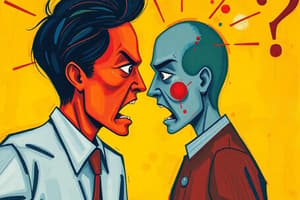Podcast
Questions and Answers
How do angry participants differ from control participants when it comes to focusing on rewarding images?
How do angry participants differ from control participants when it comes to focusing on rewarding images?
- They focus less on rewarding images.
- They focus only on threatening images.
- They focus more on rewarding images. (correct)
- They focus equally on rewarding images.
What is the relationship between anger and visual attention to threats?
What is the relationship between anger and visual attention to threats?
- Anger increases attention to threats. (correct)
- Anger decreases attention to threats.
- Angry participants ignore threats completely.
- Anger has no effect on attention to threats.
How do fearful participants differ from control participants in terms of focusing on threatening images?
How do fearful participants differ from control participants in terms of focusing on threatening images?
- They focus on rewarding images instead.
- They focus more on threatening images. (correct)
- They focus less on threatening images.
- They ignore threatening images completely.
What did the study by Keltner et al. (1993) reveal about the social judgment consequences of anger?
What did the study by Keltner et al. (1993) reveal about the social judgment consequences of anger?
How do excited/happy participants behave in relation to rewarding images compared to control participants?
How do excited/happy participants behave in relation to rewarding images compared to control participants?
In terms of social judgment consequences, why do angry people tend to attribute events to others?
In terms of social judgment consequences, why do angry people tend to attribute events to others?
What is one way in which anger and happy excitement have similar effects according to the text?
What is one way in which anger and happy excitement have similar effects according to the text?
How do sad people differ from angry people in attributing events according to the text?
How do sad people differ from angry people in attributing events according to the text?
What is the key factor in determining how emotions like anger influence visual attention according to the text?
What is the key factor in determining how emotions like anger influence visual attention according to the text?
How does anger affect the focus on rewarding information compared to threatening information according to the text?
How does anger affect the focus on rewarding information compared to threatening information according to the text?
Which group was less likely to perceive risk and more optimistic according to the text?
Which group was less likely to perceive risk and more optimistic according to the text?
What type of events were participants asked to rate the likelihood of experiencing in the context of perceived risks of terrorism?
What type of events were participants asked to rate the likelihood of experiencing in the context of perceived risks of terrorism?
In the study on perceived risks of terrorism, who perceived less risk to the self - angry or fearful participants?
In the study on perceived risks of terrorism, who perceived less risk to the self - angry or fearful participants?
What did the findings for perceptions of risk in the average American reveal?
What did the findings for perceptions of risk in the average American reveal?
How do individuals dispositionally fearful differ from those low on fear?
How do individuals dispositionally fearful differ from those low on fear?
What emotions were manipulated in the experimental studies for perceived risks of terrorism?
What emotions were manipulated in the experimental studies for perceived risks of terrorism?
Who reported more anger and less fear according to the text?
Who reported more anger and less fear according to the text?
What was a key factor contributing to the difference in risk perception between men and women in terms of anger and fear?
What was a key factor contributing to the difference in risk perception between men and women in terms of anger and fear?
In the context of perceived risks of terrorism, who rated higher likelihood of experiencing risky events?
In the context of perceived risks of terrorism, who rated higher likelihood of experiencing risky events?
Who is more likely to perceive risks associated with terrorism according to the findings mentioned?
Who is more likely to perceive risks associated with terrorism according to the findings mentioned?
Anger leads people to trust others more because it is linked to seeing the cause of the problem as inside of oneself.
Anger leads people to trust others more because it is linked to seeing the cause of the problem as inside of oneself.
Expressing anger in negotiations is always effective, regardless of the other person's alternatives.
Expressing anger in negotiations is always effective, regardless of the other person's alternatives.
Being aware of the reasons for one's anger eliminates the impact of anger on judgments of a well-known person.
Being aware of the reasons for one's anger eliminates the impact of anger on judgments of a well-known person.
Sadness leads people to trust others more because it is tied to a sense that the situation has caused the problem.
Sadness leads people to trust others more because it is tied to a sense that the situation has caused the problem.
Expressing anger in negotiations can backfire if the other person gets angry in return.
Expressing anger in negotiations can backfire if the other person gets angry in return.
Match the emotion with its effect on visual attention to rewarding information:
Match the emotion with its effect on visual attention to rewarding information:
Match the emotion with its attributional orientation towards events:
Match the emotion with its attributional orientation towards events:
Match the group of participants with their focus on threatening images compared to control participants:
Match the group of participants with their focus on threatening images compared to control participants:
Match the emotion with its similarity in effects to happy excitement according to the text:
Match the emotion with its similarity in effects to happy excitement according to the text:
Match the type of events with the attributional orientation of sad people towards them according to the text:
Match the type of events with the attributional orientation of sad people towards them according to the text:
Flashcards are hidden until you start studying





